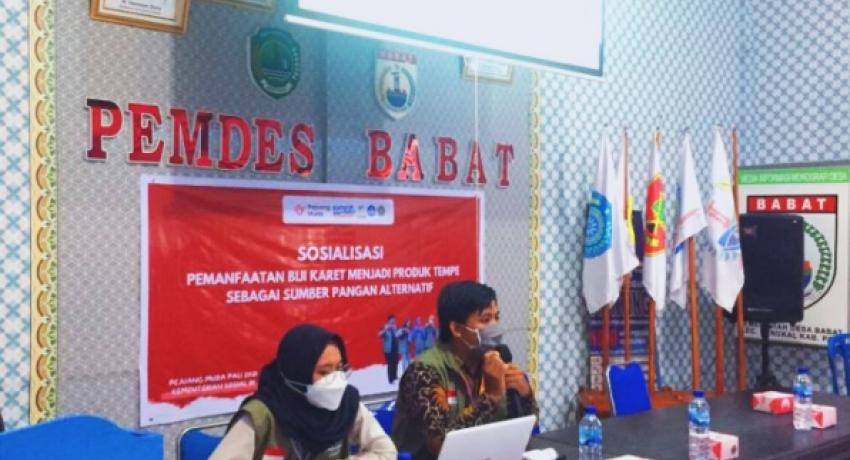The rubber tree is one of the crucial plants in Indonesia which is widely found in Sumatra. Indonesia is the largest rubber-producing country globally, contributing 26% of the world's total natural rubber production. In addition to producing latex as the main ingredient for making tires, rubber trees also absorb exhaust gases and have much more optimal oxygen. This plant also absorbs carbon dioxide gas which is processed into a carbon source for photosynthesis. This natural process is beneficial in reducing the greenhouse effect such as global warming and environmental damage. But on the other hand, this tree also has rubber seeds that are still rarely processed.
This problem raises the concern of the young UNY fighters team in South Sumatra to educate residents about making tempe from rubber seeds. Young Fighters is a synergy program between the Indonesian Ministry of Social Affairs, the Ministry of Education, Culture, Research and Technology, and the Ministry of Religion intended for students to play a role in handling poverty and social problems in society. The students were Tegar Ristianto and Alifah Nur Aqrimah (History Education), Aji Nur Wijaksono (Physics Education). They were also assisted by Mangara Klose Siahaan (Civil Engineering of Intitut Teknologi Sumatera), Gulfi Oktariani, and Nadya Lucyana (Computer System of UNSRI). They were stationed in Babat Village, Penukal District, Penukal Abab Lematang Ilir Regency, South Sumatra.
Tegar Ristianto stated that the team understood the phenomenon of people in Babat village who did not have a side job after tapping rubber and the large number of rubber seeds that had not been used as raw material for processed food. "Rubber seeds that fall from trees are just left alone, and only part of it is used as seeds by farmers," said Tegar. For this reason, the team decided to hold an information session about the potential of rubber seeds so that they have more economic value. One of the potential products is tempe from rubber seeds.
Alifah Nur Aqrimah said tempe is a food that is familiar to people's daily lives. Rubber seeds contain 31.6% carbohydrates, 15.6% protein, 40.9% fat, minerals, and cyanide. Therefore, this cyanide acid must be removed by soaking for 24 hours and boiling for 90 minutes. Cyanide acid has properties that are easy to dissolve and evaporate easily so that when washing it will be wasted with water. Meanwhile, the boiling process of linamerase and cyanide acid will accumulate. "Tempe from rubber seeds is softer than tempe from soybeans, does not rot quickly, and can be stored for 2 weeks in the refrigerator," said Alifah.
"I hope that everyone will get the benefit from this info session and share this valuable knowledge. By doing so, more people in Babat village will enjoy more economical prospect of rubber seeds and in the long run, will improve the family income,” said the Head of Babat Village, Arie Meidiansyah, M.Pd.
One of the residents, Agus expressed his joy and enthusiasm during the socialization activities. According to him, the information conveyed was very clear and provided new information. He hoped that the people of Babat Village would be moved to learn more deeply about using rubber seeds to make alternative food products in the form of tempe.





